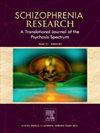针对高危精神状态女性的性别群体认知行为疗法:一项随机对照试验。
IF 3.5
2区 医学
Q1 PSYCHIATRY
引用次数: 0
摘要
高危精神状态个体的性别差异突出表明,需要针对特定性别的需求提供量身定制的精神卫生服务。虽然认知行为疗法(CBT)被认为是一种有效的干预精神障碍和ARMS,但针对性别的CBT治疗ARMS的研究有限。本研究比较了团体CBT与心理教育对ARMS女性功能和症状结局的影响,以及向精神病过渡的可能性。178名患有ARMS的女性被招募并随机分配到女性特定组CBT或心理教育组。在基线和干预后评估功能和症状结果,并在初始评估后12个月评估向精神病的过渡。两种干预都显示出总体功能的显著改善和妄想严重程度的降低,但两组之间没有显著的相互作用。然而,与心理教育组相比,完成了整个团体CBT课程的参与者在整体功能上有了实质性的改善,幻听也有了显著的减少。在治疗期间或12个月的随访期间,没有参与者出现精神病。研究结果表明,如果维持足够的干预剂量,群体CBT可以有效地增强功能和症状结果。本文章由计算机程序翻译,如有差异,请以英文原文为准。
Gender-specific group cognitive behavioral therapy for women with at-risk mental state: A randomized controlled trial
Gender differences in individuals at risk mental state (ARMS) highlight the need for mental health service tailored to gender-specific needs. While Cognitive Behavioral Therapy (CBT) is recognized as an effective intervention for psychotic disorders and ARMS, research on gender-specific CBT for ARMS is limited. This study compares the effects of group CBT with psychoeducation on functional and symptomatic outcomes, and the likelihood of transition to psychosis, in women with ARMS. One hundred and Seventy-eight women with ARMS were recruited and randomly assigned to either women-specific group CBT or psychoeducation. Functioning and symptomatic outcomes were assessed at baseline and post-intervention, and transition to psychosis was evaluated 12 months after the initial assessment.
Both interventions showed significant improvements in overall functioning and reductions in delusion severity but without a significant interaction between the groups. However, participants who completed the full course of group CBT exhibited substantial improvements in overall functioning and a notable reduction in auditory hallucinations compared to the psychoeducation group. None of the participants developed psychosis during the treatment period or the 12-month follow-up. The findings suggest that group CBT can effectively enhance functional and symptomatic outcomes, provided a sufficient intervention dosage is maintained.
求助全文
通过发布文献求助,成功后即可免费获取论文全文。
去求助
来源期刊

Schizophrenia Research
医学-精神病学
CiteScore
7.50
自引率
8.90%
发文量
429
审稿时长
10.2 weeks
期刊介绍:
As official journal of the Schizophrenia International Research Society (SIRS) Schizophrenia Research is THE journal of choice for international researchers and clinicians to share their work with the global schizophrenia research community. More than 6000 institutes have online or print (or both) access to this journal - the largest specialist journal in the field, with the largest readership!
Schizophrenia Research''s time to first decision is as fast as 6 weeks and its publishing speed is as fast as 4 weeks until online publication (corrected proof/Article in Press) after acceptance and 14 weeks from acceptance until publication in a printed issue.
The journal publishes novel papers that really contribute to understanding the biology and treatment of schizophrenic disorders; Schizophrenia Research brings together biological, clinical and psychological research in order to stimulate the synthesis of findings from all disciplines involved in improving patient outcomes in schizophrenia.
 求助内容:
求助内容: 应助结果提醒方式:
应助结果提醒方式:


